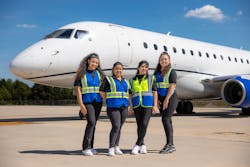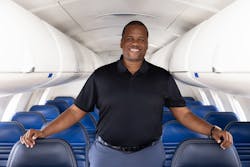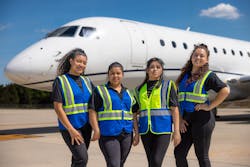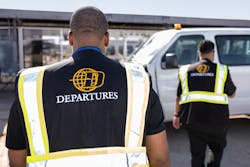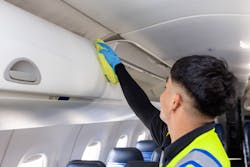Ready for Takeoff: Departures Aviation Uses Tech to Take Its Services to the Next Level
If ground support operations are the backbone of the aviation industry, ensuring everything runs smoothly pre and post flight, then the subcontractors that provide niche services to those organizations are the lifeblood, their work flowing quietly throughout the bustling ground-side environment to perform vital yet often unsung tasks.
Departures Aviation is just such an organization, a Philadelphia-based company specializing in aircraft cabin cleaning and janitorial services within the commercial airline sector. Ground Support Worldwide recently sat down with CEO Gary Nunley to get his unique insights drawing from a career that spans both the airline and ground handling sides of the business. What he told us is a telling account of the critical issues facing the ground handling business today, as well as a shining example of how technological ingenuity is changing aviation ground support in ways large and small.
General aviation to commercial powerhouse
The journey of Departures Aviation began in 2015, predating Nunley's arrival in 2023. "Departures started in general aviation. We were conducting post-manufacturing cleans for Cessna out in Wichita, Kansas," Nunley explains.
From there, the company began its transition to the commercial airline sector, handling overnight cleans for some United Express carriers at Washington Dulles Airport.
A new ownership group took over in 2017, shifting the focus entirely to commercial airlines. Then from 2020 to 2023, the ownership group dedicated its efforts to stabilizing the business post-pandemic.
Nunley was brought on with a clear mandate: "To grow the organization and take us to the next level," he recalls.
Geographically, Departures' largest operation is at Washington Dulles, serving the broader Washington DC Metro area, including DCA and BWI. The company also serves customers in Houston, Denver and the Lincoln/Omaha, Nebraska region.
Gary Nunley, CEO, Departures Aviation
Airline operations to ground support innovation
Nunley's professional history is deeply rooted in the airline industry. "I have a background in operations, and when I left the airlines, I was overseeing airline airport operations in about 100 cities across North America," he shares.
He also has extensive experience in aviation safety, having initiated safety programs for a previous airline, which then evolved into a broader safety consultancy. "I started a couple of safety programs within an airline, and that ultimately led to a broader safety consultancy, working with a lot of airlines globally in the areas of aviation safety, emergency response, ground safety, cargo and security, as well."
It was during this time that Nunley first encountered Departures Aviation as a vendor providing cabin cleaning services. "Aircraft cleaning was part of my purview and one of my partner vendors at the time was Departures," he recalls, noting that he was asked to join the organization, which he considered a unique opportunity to make an impact.
"If I would have asked myself 10 years ago if I wanted to run a cabin cleaning company, it probably would not have been a part of my calculus, but when the opportunity came up, it was a time for me to reflect on the future of my career and I thought, here's a really interesting opportunity where I can make an impact with my team members and also with the industry at large, so why not?"
Transitioning from the airline side to ground handling has been an insightful experience for Nunley. "Honestly, that was two and a half years ago, and it has been a fantastic ride," he says. "It's been so different than anything I've done before. You learn as you go what works and what doesn't. You learn the nuances of the ground handling space versus the airline space."
He adds, "There's a really stark dichotomy between the airlines and the ground handlers. You're talking to the airline as a potential customer versus the airline talking to the ground handler as a vendor. I'm definitely enjoying it," he says.
Agility, retention, and industry-leading standards
Nunley believes several factors set Departures Aviation apart from its competitors, including the implementation of a comprehensive safety and training structure similar to those typically found in much larger organizations.
Nunley says he leveraged his experience as an auditor for both the IATA Operational Safety Audit (IOSA) for airlines and the IATA Safety Audit for Ground Operations (ISAGO) to build robust systems.
"I'm fortunate I got to see the industry around the world - the different processes and procedures that ground handlers have implemented, and then processes and procedures that airlines have implemented," he says. "I knew what both sides were doing and really what worked nicely."
While not ISAGO certified, Departures Aviation operates with processes and procedures that align with ISAGO standards. "As a small company, we're not ISAGO certified because we don't need to be. But if we were to have an audit for ISAGO, we would have very much of the same things that a larger company like Swissport or dnata have in place."
This commitment to quality allows the company to confidently engage with potential international airline customers.
"We're following the same safety procedures. We have an SMS, whereas maybe some smaller organizations haven't taken that step because it's not mandated," Nunley says.
Departures' training programs are also IATA AHM compliant, meeting international industry expectations. "Knowing what the industry is looking for from a international perspective, and then putting that into Departures, gave us the ability to act like a big partner with a small company feel," Nunley says.
He also emphasizes the benefit of remaining agile, thanks to the smaller size of the company. "We remain open to the needs of industry, and we can pivot pretty quickly," he states.
He cites the company's unique ability to respond to urgent client needs. "We've done some things for some of our customers that a larger organization just couldn't do. Customers call me, the CEO of an organization, because if you need something done tomorrow, we're able to do it because there's not a lot of red tape here."
This ease of access contributes to customer retention. "That's a benefit to our customers," he says. "Their needs are constantly changing, and when they come to me saying, 'I need this change,' they've already gone through weeks of trying to figure out their own bureaucracy. So if I need to then layer on my own bureaucracy before I can make that move, it just adds time. People don't like that. So for us, being extremely agile is important."
Departures Aviation enjoys a turnover rate of less than 15%, significantly lower than the industry average.
Another significant differentiator for Departures Aviation is its remarkable employee retention rate.
"Our turnover rate today is somewhere between 10% and 15% annually," Nunley states. This is a stark contrast to the industry norm, where "from a cabin cleaning perspective, this could be easily 100/200% annually," he says.
Nunley attributes this success to a concerted effort to help employees recognize their value and importance within the broader aviation ecosystem.
"When a team member comes into our group, we don't just classify them as a cabin cleaner, although that's what they actually are. We train them in terms of, 'here's how you actually fit into the aircraft turn process. Here's why you are important. Here's what could happen if we don't do our jobs correctly.'"
He offers a compelling example: "One thing I like to tell my team members is, if a passenger gets on an airplane and it's dirty, they psychologically associate that with the airplane being unsafe."
He emphasizes the importance of first impressions, especially for the significant portion of passengers for whom it's their first flight of the year. "I explain this to my team members so they recognize how important their role is, and how our customers - the airlines - benefit. Their customers are our customers, and we take it just as seriously."
The consistency of familiar faces also fosters a more collaborative environment. "If we can get our team to stay, it passes the benefit on to our customers. The flight attendants see our people every day, the pilots see them every day, gate agents see them every day... familiar faces."
A highly engaged ownership group that's willing to invest resources in growth initiatives, coupled with a stable workforce, has helped Departures Aviation focus on expansion.
Building on strong partnerships
Nunley points to several pivotal moments that have contributed to Departures Aviation's success, such as having what he calls a "highly engaged ownership group, willing to invest resources in growth initiatives."
He continues, "From a resource perspective, they're not shy about saying, 'hey, let's look at every opportunity that comes along and really lean into it.'"
This support allows Nunley to pursue ambitious expansion plans with confidence. "I'm fortunate in that respect, that when I go to my board and tell them what we're thinking about doing as an organization, they're usually fully on board. That really helps in taking any of the constraints off."
Second, a strong and continually growing partnership with a large ground handler at Washington Dulles Airport has been a significant part of Departures' success.
"We've been very fortunate to partner with them as a subcontractor. Our relationship with them has continued to grow year over year," Nunley says. "This collaboration has demonstrated Departures Aviation's capability to handle high-volume work effectively and cost-efficiently."
The consistency of their retained employees further solidifies this. "If we're throwing the same employees at this particular ground handler, day after day, week after week, month after month, they start to see the improvement that hits its stride and doesn't degrade. That's one of the things that really, really helped us out."
Departures Aviation has created an internal software suite called Cabin View 360, which uses VR and gamification to help train agents. Allowing them to learn while having a realistic interaction with specific aircraft interiors ensures they can clean most effectively when on the job.
Focus on tech
Nunley is most passionate about disrupting the traditional approach to cabin cleaning through technology. He recounts a conversation with a major airline executive who challenged service providers to "be disruptive."
"I had a conversation with one of the major airlines last fall, and I asked what they want to see from their service providers. And one of the gentlemen said, 'We want them to be disruptive.'"
This inspired the creation of Cabin View 360, an internal software suite focused on training and quality control through virtual reality.
"I've been thinking about how a cleaning company can become disruptive. How do we do something that's totally unique? One of the things that we decided to focus on is how we think about new technology as it relates to cabin cleaning," Nunley says.
"We have created an internal software suite called Cabin View 360," Nunley explains, pointing to the VR simulator used to give employees a realistic experience while training.
The goal, he says, is to provide a consistent level of quality from agents in all locations.
"I call it the Big Mac approach," he says. "If I buy a Big Mac in Albuquerque, New Mexico, and I buy one in Bangor Maine, they taste exactly the same, right?"
He details the current training gap: "If I take an agent and I train them in the classroom, with a PowerPoint and a picture of a seat, what happens when that agent is really doing a live flight? I've got to try to get this brand new agent up to speed on the aircraft interior, the layout, what an overhead bin is...
"A lot of our agents have never even flown before, so they've never seen the first class suite of a Qatar A350 or an Emirates A380. That's going to be totally foreign; the first time they see it is while we're actually trying to clean this airplane and get it turned around for the next set of customers."
The VR solution bridges this, Nunley says. "What if we could sit them in a chair in our training classroom, put them in the VR simulator and have them explore the Qatar A350 first class suite, have them sit in the passenger point of view and be able to look up, down and around, look at the cracks between the seat and the window - all the areas where dirt and dust and grime can accumulate. What if we can give them as much time as they need to get comfortable and familiar?"
Nunley says Cabin View 360 has the aircraft walk-through now in the VR environment, as well as the passenger point of view. "We also use gamification - the agent has to actually find as much of the dirt and grime throughout the aircraft cabin as possible.
"Agents get scored, and if they need some polishing up, we send them back through so by the time they get to the airplane, all of this gets more familiar until it becomes muscle memory."
Departures Aviation is collaborating with Arizona State University to integrate AI avatar instructors into Cabin View 360.
Nunley notes that for many agents, English is not their first language. This innovative approach aims to significantly increase knowledge retention, especially for agents whose first language is not English, and removes the need for multiple language-specific human instructors.
"This AI avatar instructor now is able to communicate with the agent in their most comfortable language. Agents are able to ask the AI things like 'How does this work? What cleaning solution should I use here?' And then those answers are flowing back and forth without the old-school 'click next' on the on the computer screen type of training environment."
Nunley foresees significant improvements. "We're hoping this is going to increase the retention of knowledge. We're looking forward to having it fully rolled out by the end of the year. In conversations with our customers and potential customers, we're happy to be the kind of the group that's bringing this to them."
Rapid growth and strategic expansion
Looking to the future, Nunley describes 2025 as a year "unlike any year we've had so far at Departures Aviation."
Nunley says Departures Aviation anticipates rapid organic growth, with at least one major startup on the West Coast this fall and two to three smaller but impactful ventures in early 2026.
While organic growth is the primary strategy, mergers and acquisitions are also on the table. "That's always something that we're looking at," he says. "We've had conversations throughout the course of the year and we think that's part of the strategy."
Nunley is confident that Departures Aviation has "hit its stride," having spent considerable time establishing itself within the industry.
"We've spent a lot of time getting to know the industry, getting ourselves out there, letting people get to know us as an organization," he says. "We're anticipating 2025 and 2026 to be rapid growth years. We're pretty confident that we're going to hit our growth metrics in both years."
